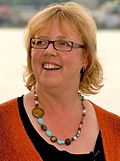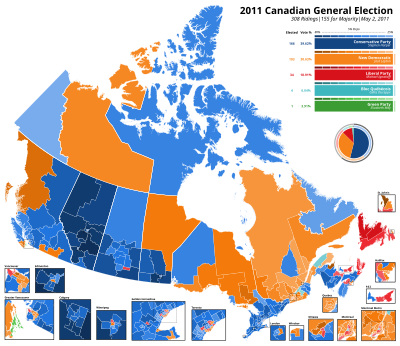
Back Kanadische Unterhauswahl 2011 German Elecciones federales de Canadá de 2011 Spanish Élections fédérales canadiennes de 2011 French Eleccións federais do Canadá de 2011 Galician הבחירות הפרלמנטריות בקנדה 2011 HE Elezioni federali in Canada del 2011 Italian 2011年カナダ総選挙 Japanese 2011년 캐나다 연방 선거 Korean Canadese federale verkiezingen 2011 Dutch Eleições federais no Canadá em 2011 Portuguese
| ||||||||||||||||||||||||||||||||||||||||||||||||||||||||||||||||||||||||||||||||||||||||||||||||
308 seats in the House of Commons 155 seats needed for a majority | ||||||||||||||||||||||||||||||||||||||||||||||||||||||||||||||||||||||||||||||||||||||||||||||||
|---|---|---|---|---|---|---|---|---|---|---|---|---|---|---|---|---|---|---|---|---|---|---|---|---|---|---|---|---|---|---|---|---|---|---|---|---|---|---|---|---|---|---|---|---|---|---|---|---|---|---|---|---|---|---|---|---|---|---|---|---|---|---|---|---|---|---|---|---|---|---|---|---|---|---|---|---|---|---|---|---|---|---|---|---|---|---|---|---|---|---|---|---|---|---|---|---|
| Opinion polls | ||||||||||||||||||||||||||||||||||||||||||||||||||||||||||||||||||||||||||||||||||||||||||||||||
| Turnout | 61.1% ( | |||||||||||||||||||||||||||||||||||||||||||||||||||||||||||||||||||||||||||||||||||||||||||||||
| ||||||||||||||||||||||||||||||||||||||||||||||||||||||||||||||||||||||||||||||||||||||||||||||||
| ||||||||||||||||||||||||||||||||||||||||||||||||||||||||||||||||||||||||||||||||||||||||||||||||
The 2011 Canadian federal election was held on May 2, 2011, to elect members to the House of Commons of Canada of the 41st Canadian Parliament.
The writs of election for the 2011 election were issued by Governor General David Johnston on March 26. Prime Minister Stephen Harper advised the Governor General to dissolve parliament after the House of Commons passed a motion of non-confidence against the government, finding it to be in contempt of Parliament. A few days before, the three opposition parties had rejected the minority government's proposed budget.[1]
The Conservative Party remained in power, increasing its seat count from a minority to a majority government, marking the first time since 1988 that a right-of-centre party formed a majority government. The Liberal Party, sometimes dubbed the "natural governing party", was reduced to third party status for the first time as they won the fewest seats in its history, and party leader Michael Ignatieff was defeated in his riding. The Bloc Québécois lost official party status for the first time since contesting general elections in 1993. Party leader Gilles Duceppe was defeated in his riding and subsequently resigned as leader. The New Democratic Party led by Jack Layton won the largest number of seats in its history, enabling it to form the Official Opposition for the first time in the party's history, as they made a major breakthrough in Quebec. The Green Party elected its first member to the House of Commons with its leader, Elizabeth May, becoming MP for Saanich—Gulf Islands.
- ^ Wells, Paul (May 5, 2011). "The untold story of the 2011 election: Chapter 2". Maclean's. Archived from the original on April 23, 2012. Retrieved March 19, 2012.






